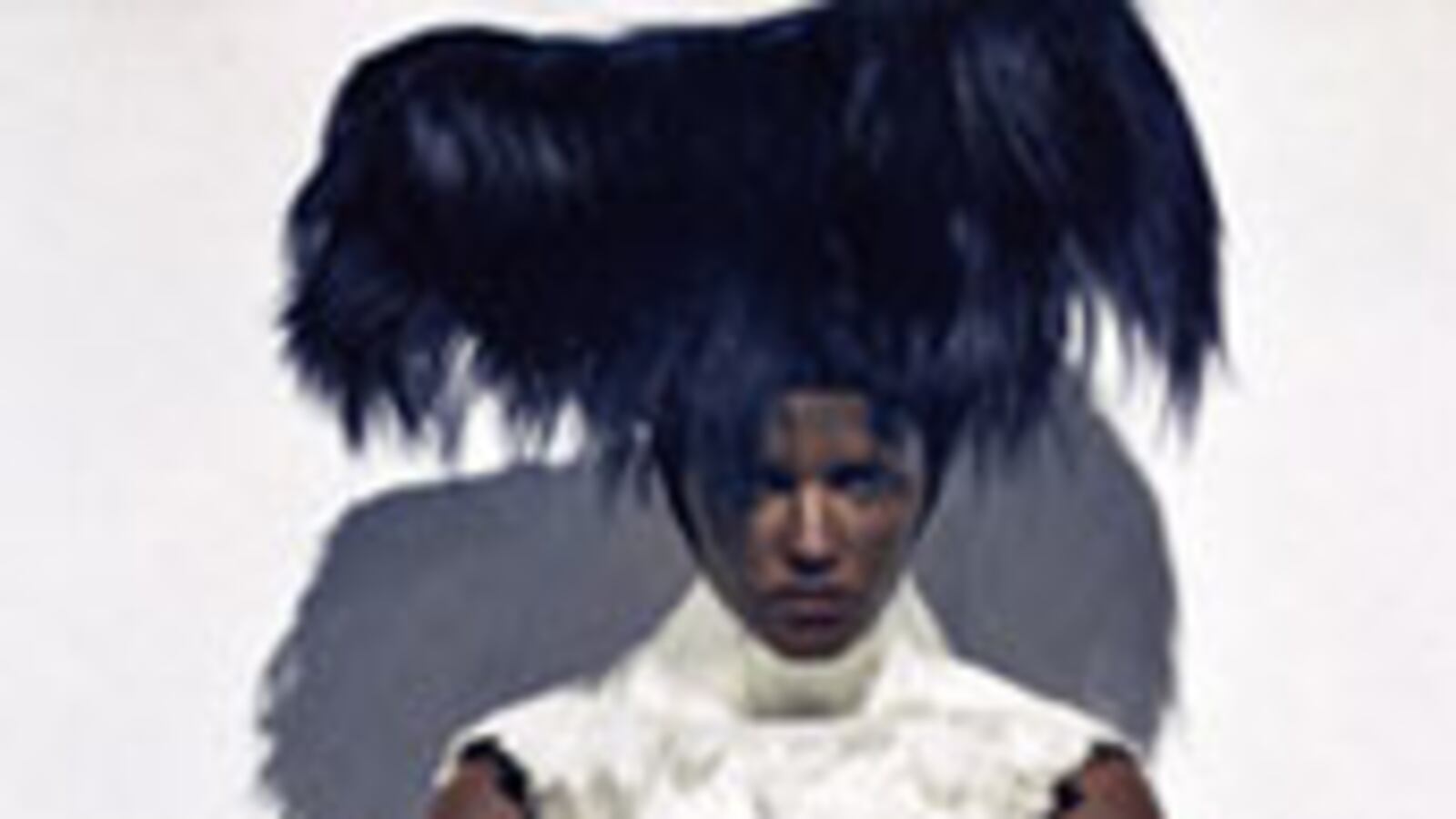
What was French Vogue Editor Carine Roitfeld thinking when she put It Girl Lara Stone in blackface for a fashion spread in the magazine’s latest issue?
If Roitfeld’s past scandals are any indication, not very much. The editor and stylist is a veteran provocateur, having featured photos of pregnant models smoking cigarettes, a goateed drag queen, and plenty of other oddities in the eight years she’s run the magazine. But deep down, she’s just a fashion obsessive, myopically focused on clothes and beauty—not racial politics.
“It’s neither vapid enough nor thoughtful enough,” said cover girl Veronica Webb. “You have to ask yourself ‘What’s the point?’”
The spread, shot by photographer Steven Klein, shows 25-year-old Stone (a Dutch model who’s being championed throughout the industry for her size-4 “curves”) in an array of provocative poses. In some pictures, her skin is its natural ivory. In others, she is painted dark brown. In others, she is partially coated in crackly white paint. There’s no accompanying article, no explanation at all (apart from descriptions of the outfits featured), and Klein and Roitfeld have been unavailable for comment. The theme of the spread is described in an oblique caption as “metamorphosis.”
The outrage was swift. Some were blown away by the spread’s bumbling insensitivity. Most just grimaced at the latest volley in fashion’s awkward dialogue on race.
• Liza Gates: Duh! Of Course Fashion’s Racist
“It’s neither vapid enough nor thoughtful enough,” said pathbreaking cover girl Veronica Webb. “You have to ask yourself ‘What’s the point?’ We all wonder what we would look like if we changed everything about ourselves, if I was born blond and blue-eyed and you were born dark-skinned and with curly hair. Michael Jackson illustrated that point really well in his ‘Black or White’ video. Here it doesn’t come across so clearly. It’s definitely provocative but it’s mostly confounding.”
“The exoticism of the model is supposed to be the story but it ends up being nothing,” said New Yorker writer Hilton Als. “It’s not offensive, it’s just the scraping of the bottom of the fashion world barrel to come up with something. There’s almost nothing to say except to point out that when fashion fails, it fails miserably to be provocative.”
“Who knows what they were thinking,” said Beth Ann Hardison, Naomi Campbell’s former modeling agent and perhaps the industry’s leading advocate for diversity. “I think they were just being creative, I don’t think they’re trying to poke at a race…I can’t say they weren’t. If they made her brown the whole time, but the white paint—I don’t know what the fuck they’re trying to say, I’m completely confused.”
"This appears to be just some editor's creative flourish, pure and simple,” said Teri Agins, fashion writer and Wall Street Journal Columnist. “It doesnt seem to me to be a minstrel-like depiction... I have a hard time reading "race" into this.”
Anne Slowey, the fashion news director of Elle magazine, thought there was an idea there—but that the execution was terrible. Referring to a picture in which Stone is done up like some sort of Moroccan royal in a militaristic Galliano jacket and a big headdress (legs spread, panties showing), Slowey said, “I think they think they’re celebrating the beauty of a culture but it’s misguided. It’s an industry filled with people who have no idea about history and politics.”
“I’m not big on punishment, but they need a good smack,” said Russell Simmons.
But those offended by the spread are hardly appeased by pleas of ignorance. Blackface issues have arisen in fashion before—from Viktor and Rolf’s 2001 show, The Black Hole, in which models were painted jet-black, to a 2007 scandal involving American Apparel clothes on a model with exaggerated black features in i-D magazine—and no one seems to have gotten any more sensitive.
“Maybe a boycott is in order,” said hip-hop mogul Russell Simmons. “The editors are probably blind and don't see the clear and present existence of more subtle racism today. [They] are an arm's length away from people who are suffering, still dealing with the horrible effects of slavery, and blatant racism. I'm not big on punishment but they need a good smack.”
Jacob Bernstein is a senior reporter at The Daily Beast. Prior to joining the Beast, he was a features writer at WWD and W Magazine. He has also written for New York magazine, Paper, and The Huffington Post.






